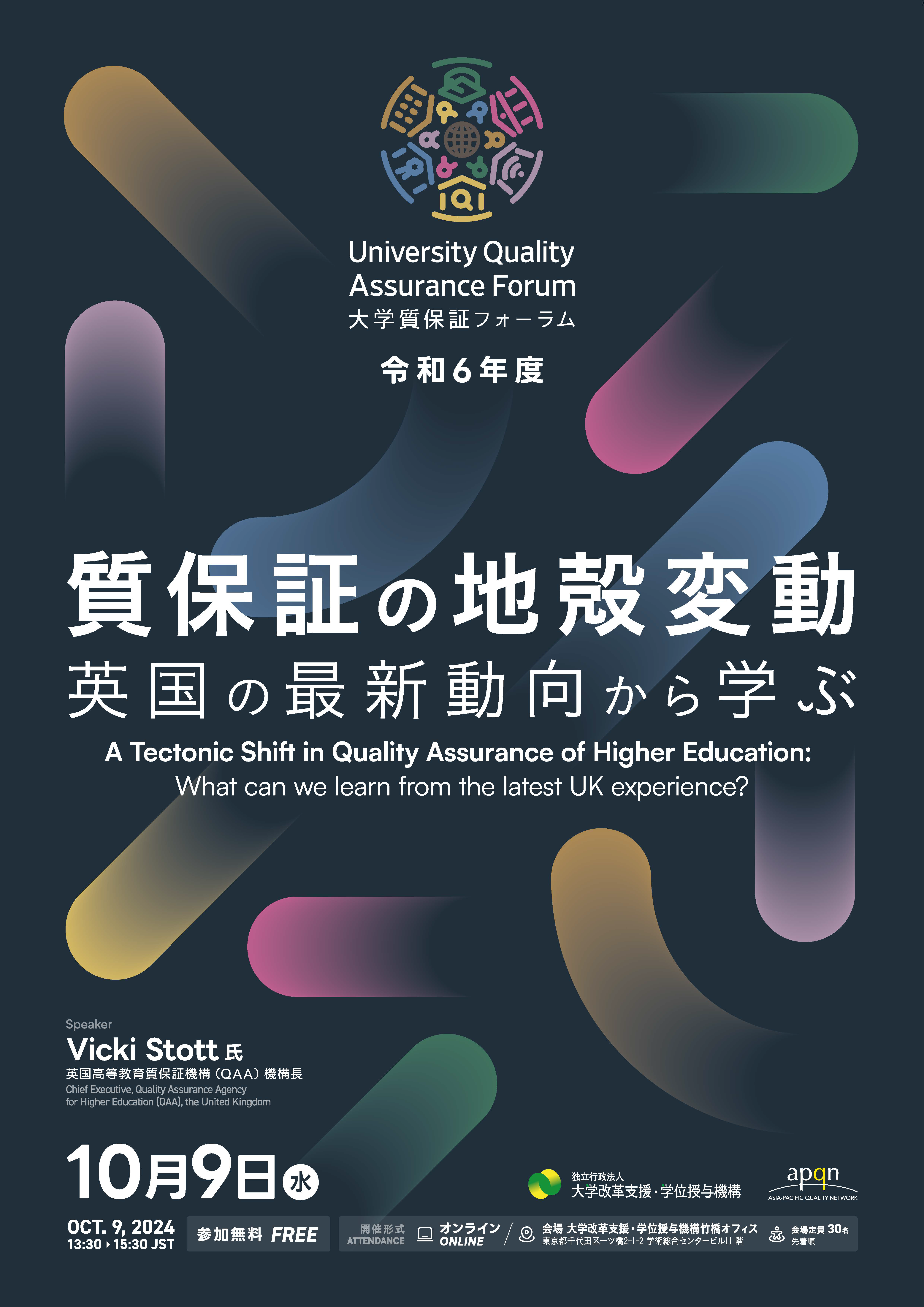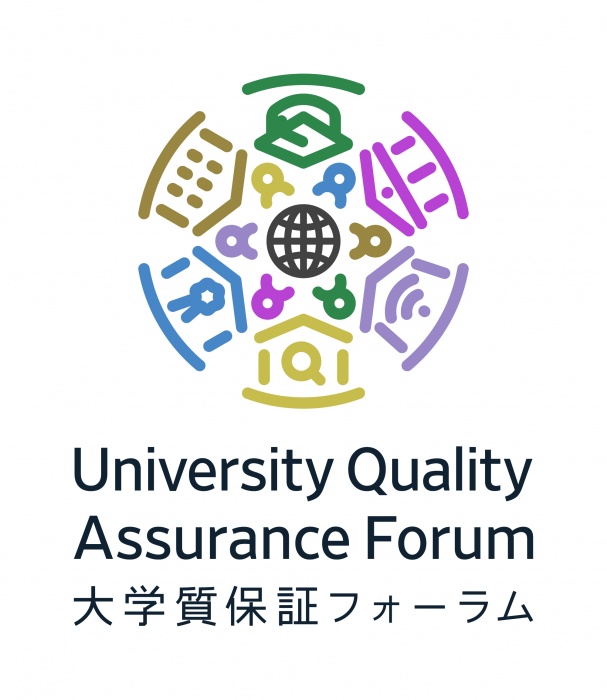NIAD-QE University Quality Assurance Forum 2024 (Wednesday, 9th October)
This forum has ended.


University Quality Assurance Forum 2024
A Tectonic Shift in Quality Assurance of Higher Education:
What can we learn from the latest UK experience?
Wednesday, 9th October 2024
1:30pm - 3:30pm JST (4:30am - 6:30am GMT)
Join ONLINE or ON-SITE (30 seats) at NIAD-QE TAKEBASHI Office, Tokyo
Japanese-English simultaneous interpretation available
Organizer:
National Institution for Academic Degrees and Quality Enhancement of Higher Education (NIAD-QE)
Supporting Organizations:
Asia-Pacific Quality Network (APQN)
Japan Association for College Accreditation (JACA)
Japan Association for Quality of University Education (JAQUE)
Japan Institution for Higher Education Evaluation (JIHEE)
Japan Network of Certified Evaluation and Accreditation Agencies (JNCEAA)
Japan University Accreditation Association (JUAA)
Overview
Twenty years have passed since the introduction of the Certified Evaluation and Accreditation system for higher education in Japan. Throughout the time, efforts have been made to design a comprehensive university evaluation and quality assurance system and ensure its smooth implementation and awareness in society. Two decades seem to be long enough for us to accumulate experience and generate ideas to reconsider the nature, significance, and future of quality assurance and evaluation in higher education.
A significant change is occurring in several regions in the world, prompting, or could possibly prompt, a reshaping of the evaluation and quality assurance system. The change could be described as a “tectonic shift” in evaluation and quality assurance of higher education. The University Quality Assurance Forum 2024 will focus on the latest experience in the UK.
The UK has recently been through a significant shift regarding the quality assurance landscape. The long-standing mainstream quality assurance agency for universities and other higher education institutions in England, the Quality Assurance Agency for Higher Education (QAA), has been replaced by the Office for Students (OfS), which became responsible for the 'Register of English higher education providers.' It was followed by the complete withdrawal of QAA, which had been acting as a cooperator of OfS for the time being, from the original system in March 2023.
Understanding the background and implications of these changes, as well as the QAA's new services and aims, is crucial for considering the future of the evaluation and quality assurance system in Japan.
For this forum, NIAD-QE invites Ms. Vicki Stott, Chief Executive of the UK Quality Assurance Agency for Higher Education (QAA). Ms. Stott will share her perspective on what this "tectonic shift" in the UK suggests and lead us to envision the future of quality assurance for higher education in Japan.
Agenda & Materials
Chaired by MORI Rie: Professor, Research Department, NIAD-QE
| 1:30PM | Opening Address |
||
| 1:35PM | Introduction of the Speaker |
||
| 1:40PM | Keynote Speech A Tectonic Shift in Quality Assurance of Higher Education: What can we learn from the latest UK experience? |
||
| 2:30PM | Break |
||
| 2:40PM | Q&A Session and Discussion <Moderator> |
||
| 3:25PM | Closing Remarks |
||
| 3:30PM | End of Forum |
Registration
This forum has ended.
Thank you for your attendance and participation.
Photos
_241203_145148.jpg)
.jpg) Keynote Speech by Ms. Vicki Stott The Venue
Keynote Speech by Ms. Vicki Stott The Venue
.jpg)
.jpg) Discussion Speakers’ Group Photo
Discussion Speakers’ Group Photo
Recording
The recording has expired.
Report
The NIAD-QE University Quality Assurance Forum 2024 entitled “A Tectonic Shift in Quality Assurance of Higher Education: What can we learn from the latest UK experience?” was held on October 9, 2024. The forum invited Ms. Vicki Stott, Chief Executive of Quality Assurance Agency for Higher Education (QAA), the United Kingdom, and over 370 participants joined online and in-person from across Japan and abroad.
The program was chaired by Prof. MORI Rie from Research Department of NIAD-QE. The forum began with the opening address by HATTORI Yasunao. Ph.D., President of NIAD-QE.
Ms. Stott introduced with an overview of QAA, an independent, not-for-profit quality assurance agency established in 1997, with members of 275 higher education institutions in the UK. The model of quality assurance in higher education in the UK is different in England, Scotland, Wales, and Northern Ireland, and QAA’s scope of service varies according to the needs of each nation’s sector. She noted that in recent years there has been an increased alignment in the overall direction of quality assurance and regulation across the UK’s devolved nations: Scotland, Wales and Northern Ireland, while the quality assurance landscape in England has been moving towards a slight different direction. She then introduced the quality assurance systems in each of the nations to explain further.
England in particular, Ms. Stott referred to its change of direction in the role of QAA after the withdrawal from the Register of English higher education providers, in which QAA had been acting as a cooperator in part of the assessment process. She emphasized that while the registration scheme focuses solely on the regulatory baseline, the withdrawal allows QAA to be more agile and responsive to the changing environment of higher education by providing advice, guidance, and good practices to its member institutions to help them achieve higher education quality above those baselines. She also introduced that QAA provides relevant resources relating to artificial intelligence (AI) in an agile manner, responding to the rise of AI in higher education.
In the latter half of the program, Prof. TODAYAMA Kazuhisa, Dean of Research Department of NIAD-QE, moderated the Q&A and discussion session. Many questions were asked by the audience such as the involvement of students in QAA's quality assurance activities, the status of appointments to reviewers from industry and other countries, and how good practices are identified in the review process. For the question of how far the use of AI in education has progressed in the UK, Ms. Stott pointed out, with her answer, QAA's views on the role of how AI should play and the need for guidelines to ensure its proper use. Audience also showed high interest in the Office for Students (OfS) which is the responsible body of the Register of English higher education providers. Ms. Stott explained the role of the OfS with a comparison with QAA. The discussion led to wider topics of the guarantee of university autonomy and the significance of universities to undergo evaluation, and the speakers and audience exchanged their perspectives enthusiastically until the very end of the session. The forum ended successfully with the closing remarks by Prof. Dr. MITSUISHI Mamoru, Vice-President of NIAD-QE.
Secretariat
Secretariat for NIAD-QE University Quality Assurance Forum 2024
International Affairs Division, NIAD-QE
![]() uqa-forum[a]niad.ac.jp *Please replace [a] with @.
uqa-forum[a]niad.ac.jp *Please replace [a] with @.

